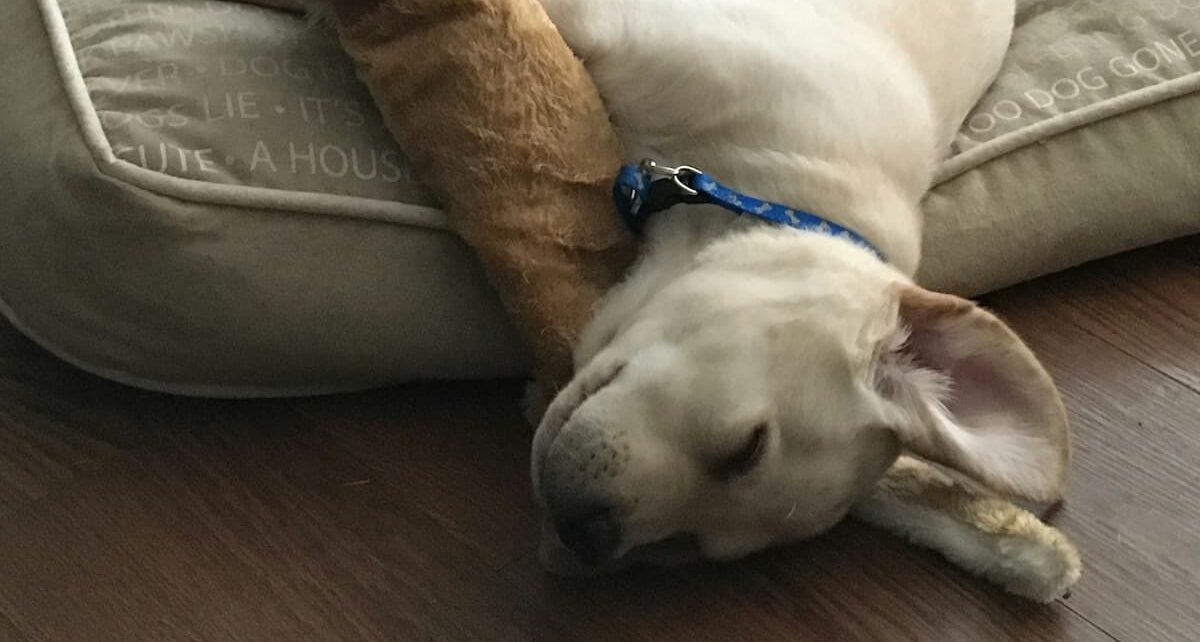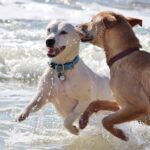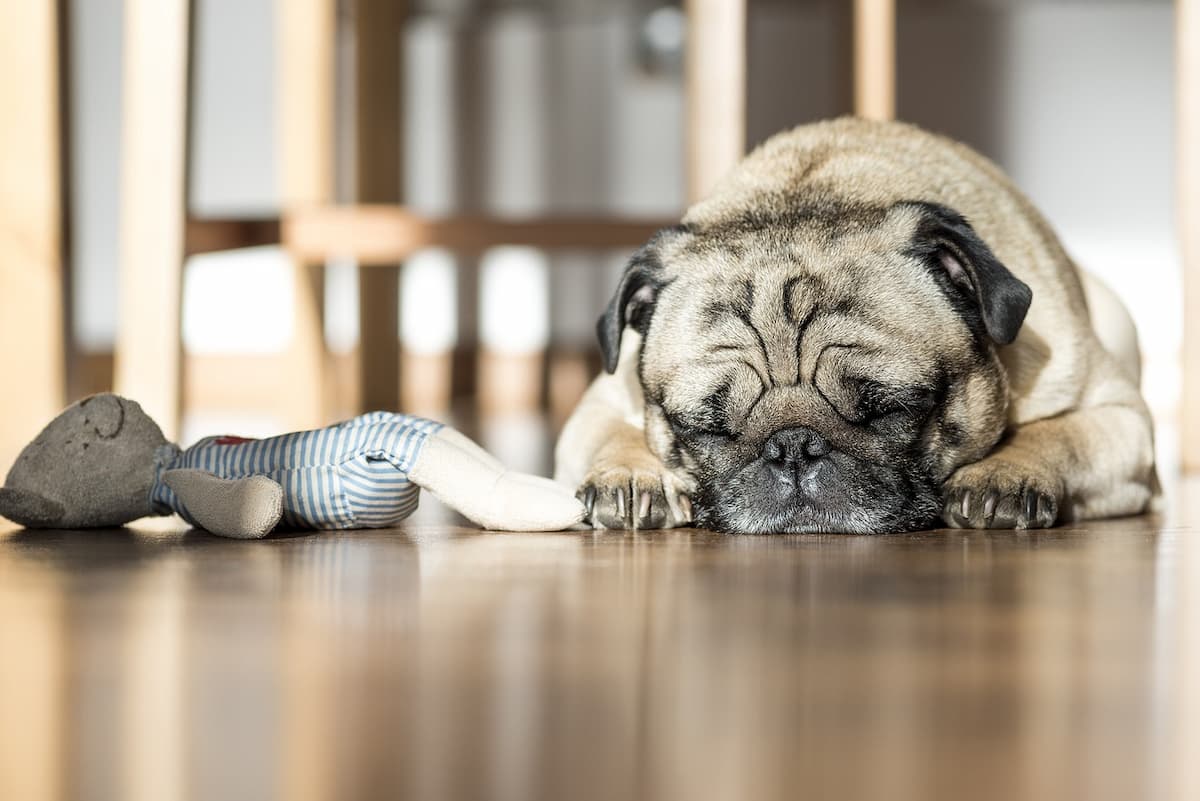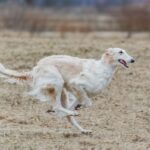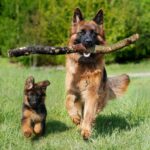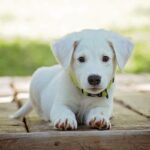Have you ever caught your furry friend in the middle of a deep slumber, only to be startled by the sight of their eyes seemingly rolling to the back of their head?
It’s a sight that can simultaneously intrigue and confuse us dog lovers.
This article will answer the question: Why do dogs roll their eyes back when they sleep?
Why Do Dogs Roll Their Eyes Back When They Sleep?
The Science Behind It
Believe it or not, there’s actually a scientific explanation for this unusual phenomenon.
According to veterinary experts, dogs have a protective membrane called the “third eyelid” or “haw.”
This thin, translucent tissue is located in the inner corner of their eye and serves as an extra layer of protection against dust, debris, and any potential harm.
During sleep, when their eyes are closed, the muscles controlling the third eyelid relax, causing it to partially cover the eye.
This results in the appearance of rolled-back eyes, creating a surreal and somewhat comical vision.
As amusing as this looks rolling their eyes back is actually a natural protective mechanism.
When dogs are in a deep sleep, their eye muscles relax, causing their eyelids to loosen as well.
Rolling their eyes back helps shield their delicate corneas from any potential harm, such as accidentally scratching their eyes on nearby objects or getting dirt or debris in their eyes while dozing outdoors.
Moreover, this eye-rolling behavior also assists in ensuring a good night’s rest.
By covering their eyes with their eyelids, dogs are blocking out any sources of light that may disturb their sleep.
Just like us, dogs need the darkness to signal their brains that it’s time to unwind and rejuvenate.
And by rolling their eyes back, they’re actively creating their very own cozy sleep environment.
The Inherent Instinct
Apart from the scientific explanation, this behavior also holds a deep-rooted instinctual meaning for our canine companions.
Dogs are descendants of wild wolves, and in the wild, they had to be constantly on alert for potential dangers even during sleep.
Rolling their eyes back is an instinctual reflex that allows them to quickly assess their surroundings while still in a state of rest.
This innate behavior can be attributed to their ancestors’ need to stay aware of their environment and respond to any potential threats, ensuring their survival in the wild.
This eye-rolling may also be a natural reflex, not unlike the involuntary twitching or wagging of their tail during sleep.
It might be an instinctive response triggered by the relaxation of their muscles and the stimulation of certain brain areas.
While the exact reason for this reflex is not fully understood, it adds further charm to our furry friends’ sleep habits.
Dreaming, But What?
Now that we understand the science and instinct behind it, another fascinating aspect to explore is what dogs dream about when their eyes are rolling back.
Just like humans, dogs experience rapid eye movement (REM) sleep, which is the stage where most dreaming occurs.
As their eyes flutter and roll back during this phase, it’s believed that they’re reenacting their daily routines – chasing a ball, running in a park, or meeting their favorite human.
While we can never truly know for sure, one thing is certain – the mysterious behavior of eye-rolling during sleep adds another layer of fascination to the already captivating world of canines.
A Sign of Contentment or Discomfort?
Interpreting your dog’s sleep signals can help you better understand their overall well-being.
While eye-rolling during sleep is typically harmless and unrelated to your pup’s emotional state, it can occasionally indicate discomfort or pain.
As such, it’s essential to observe other signs that your dog might display while sleeping to determine if they are content or disturbed.
If your dog’s eyes are rolling back, accompanied by whimpering, excessive panting, or restlessness, it could be a sign of discomfort.
In such cases, it’s advisable to consult your veterinarian to rule out any potential health issues.
You must also keep an eye out for other indicators such as body language, breathing patterns, and vocalizations.
Regular and peaceful sleeping patterns with gentle eye-rolling are generally a good indication of contentment and good health.
However, if you notice any significant changes in your dog’s sleep behavior or if you have concerns about their eye-rolling, it’s always a good idea to seek professional advice to ensure your furry friend remains happy and healthy.
In conclusion, dogs rolling their eyes back while sleeping can be a combination of natural reflexes and the different sleep stages they experience.
Enjoy the adorable sight of your pup’s eye-rolling without worry, knowing that it’s generally a sign of deep slumber rather than discomfort.
Remember to observe other sleep signals to support your understanding of their overall contentment and to seek professional guidance if you have any concerns about your beloved pet’s well-being.
FAQ
Q: Why do dogs roll their eyes back when they sleep?
A: Ah, the age-old question!
There’s actually a pretty simple explanation.
Dogs, just like us humans, have different stages of sleep.
When their eyes roll back, it’s because they’re entering the most active sleep stage, also known as the REM (Rapid Eye Movement) phase.
During this phase, the brain is at its most active, and dogs may experience vivid dreams.
Q: Do dogs dream when their eyes are rolling back?
A: Absolutely!
Dogs, being incredible creatures, do dream.
When their eyes are rolling back, they’re likely delving into the dream world, just like we do.
You may even notice their legs twitching or hear a bit of whimpering or barking during this time.
It’s as if they’re acting out their dreams in their sleep.
Q: Is rolling their eyes back a sign of discomfort or a health issue?
A: Not at all!
Rolling eyes during sleep is perfectly normal for dogs and normally indicates they are in a deep state of slumber.
Just like us, they need their restorative rest.
As long as your pup is otherwise healthy, active, and their eyes aren’t rolling while they’re awake, there’s nothing to worry about.
Q: Should I be concerned if my dog’s eyes roll back excessively?
A: Excessive eye-rolling during sleep could be a cause for concern.
If you notice this happening consistently, it’s best to consult your veterinarian.
It might indicate an underlying issue such as seizures or disturbed sleep patterns.
However, occasional eye-rolling during sleep usually doesn’t pose any problems.
Q: I’ve seen dogs roll their eyes back while awake.
Is that normal?
A: While we’re talking about sleeping dogs, it’s worth noting that rolling eyes while awake could have other meanings.
In certain situations, it might be a sign of discomfort, anxiety, or even a medical condition.
If you observe this behavior during waking hours, it’s a good idea to have your pup checked by a vet to rule out any potential issues.
Q: Can I do anything to help my dog have better quality sleep?
A: Of course!
Just like humans, dogs benefit from a cozy and safe sleeping environment.
Ensure they have a comfortable bed in a quiet area, away from excessive noise or distractions.
Keeping them physically and mentally stimulated during the day can also contribute to better sleep quality.
But don’t worry, as long as they’re getting the rest they need, their eyes will roll back naturally!
Q: So, the next time I see my dog’s eyes rolling back during sleep, I can relax and know it’s completely normal, right?
A: Absolutely, my friend!
Watching our furry buddies in their dream-filled slumber can be a heartwarming sight.
Remember, dogs use their sleep time to recharge and process all the adventures they experience during their awake hours.
As long as your pup seems happy and healthy during the day, those rolling eyes are just a delightful sign of a good nap!
Key Takeaways
While dogs rolling their eyes back when they sleep may seem adorable, it actually serves a purpose.
While we may be tempted to think that our furry friends are simply channeling their inner drama queens or playing tricks on us, the truth lies in their evolution.
Throughout centuries, dogs have come a long way from their wild ancestors.
Domestication has influenced their physical features, behaviors, and even their sleeping habits.
When dogs roll their eyes back while snoozing, it’s all about survival instincts from their wolf ancestors.
So, the next time you catch your furry friend napping and notice those eyes seemingly vanishing, there’s no need to be concerned.
It’s just their instinctual adaptation at work, a nod to their wild ancestry.
So go ahead, share this newfound knowledge with your friends and family, impress them with your doggy facts, and never again wonder why our four-legged companions have such mesmerizing sleeping styles.



